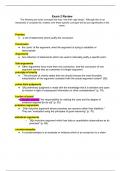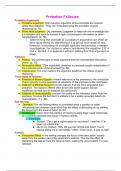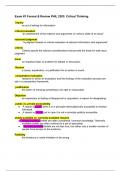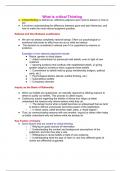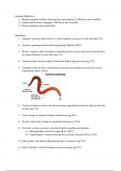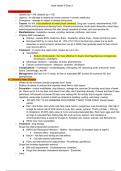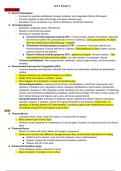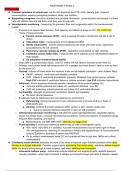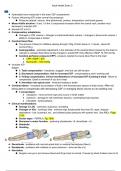Sam Houston State University
Latest uploads at Sam Houston State University. Looking for notes at Sam Houston State University? We have lots of notes, study guides and study notes available for your school.
-
148
-
2
-
15
All courses for Sam Houston State University
Popular books Sam Houston State University
Latest notes & summaries Sam Houston State University
This text provides a review of concepts that may be encountered in Exam 2. It discusses the premise as a set of statements that justify the conclusion and the conclusion as the main point of the argument. Arguments are collections of statements used to justify a specific point, and sub-arguments can have multiple conclusions, serving as premises for larger arguments. The principle of charity suggests choosing the most favorable interpretation of an argument. Prima facie judgments are tentative a...
Probative argument is an inductive argument evaluated using the principles of good reasoning, as it uses reasons rather than statistics. The strength of a probative argument can be easily determined as weak or not based on prima facie judgment, which is a preliminary judgement made with the knowledge that it is tentative and open to revision. Determining the strength typically requires a deeper investigation. Probative fallacies are common types of weak arguments that have considerable persuasiv...
Arguments are collections of statements that are used to logically support a specific point. They consist of premises, which justify the conclusion, and the logical form that connects the premises to the conclusion. Premises and conclusions are statements that are declarative in grammatical form, factual, and in principle verifiable. Certain words or phrases, known as "tell words," can be used to identify whether a statement is a premise or a conclusion. Common tell words include "therefor...
Exam #1 for PHIL 2303: Critical Thinking will include questions on various topics such as inquiry, critical evaluation, reasoned judgment, criteria, issues, reasons, comparative evaluation, justification, objections, public vs. private accessibility, widely-available vs. narrowly-available reasons, fallibility, fallacy, bias, counterexamples, context, state of practice, autonomy, confirmation bias, curiosity, open-mindedness, fair-mindedness, respect for reason, factual judgments, evaluative jud...
Critical thinking refers to reflective judgment on what to believe or how to act. It involves recognizing good and bad reasoning and making rational judgments based on evidence. While our psychological and emotional side can influence our beliefs and actions, a rational decision is supported by reasons or evidence. Non-rational judgments include biases, commitment to existing beliefs despite new evidence, ignoring conflicting evidence, and relying on beliefs held by a group or psychological fact...
The following is a prelab for the second part of the animal diversity lab.
This exam review is for the Med surg II nursing course and it covers the chapters over cardio, dysrhythmias, and infective heart disorders. It is a summary of very detailed content to lessen the overwhelming feeling of studying.
This exam review covers burns, emergency, liver, pancreas, and hematology content in critical care for adult health II in nursing. It summarizes the important points of these chapters to make studying less overwhelming.
This is an exam review that covers respiratory disorders, critical care, kidney disease, acid-base balance, and kidney transplant. I go in depth on the important points that I took away from lecture powerpoints, but give a summary instead of every detail.
An in depth review on the content of critical care and the various topics and subjects within it. It is set up per exam module and summarizes the important points within the whole module.

